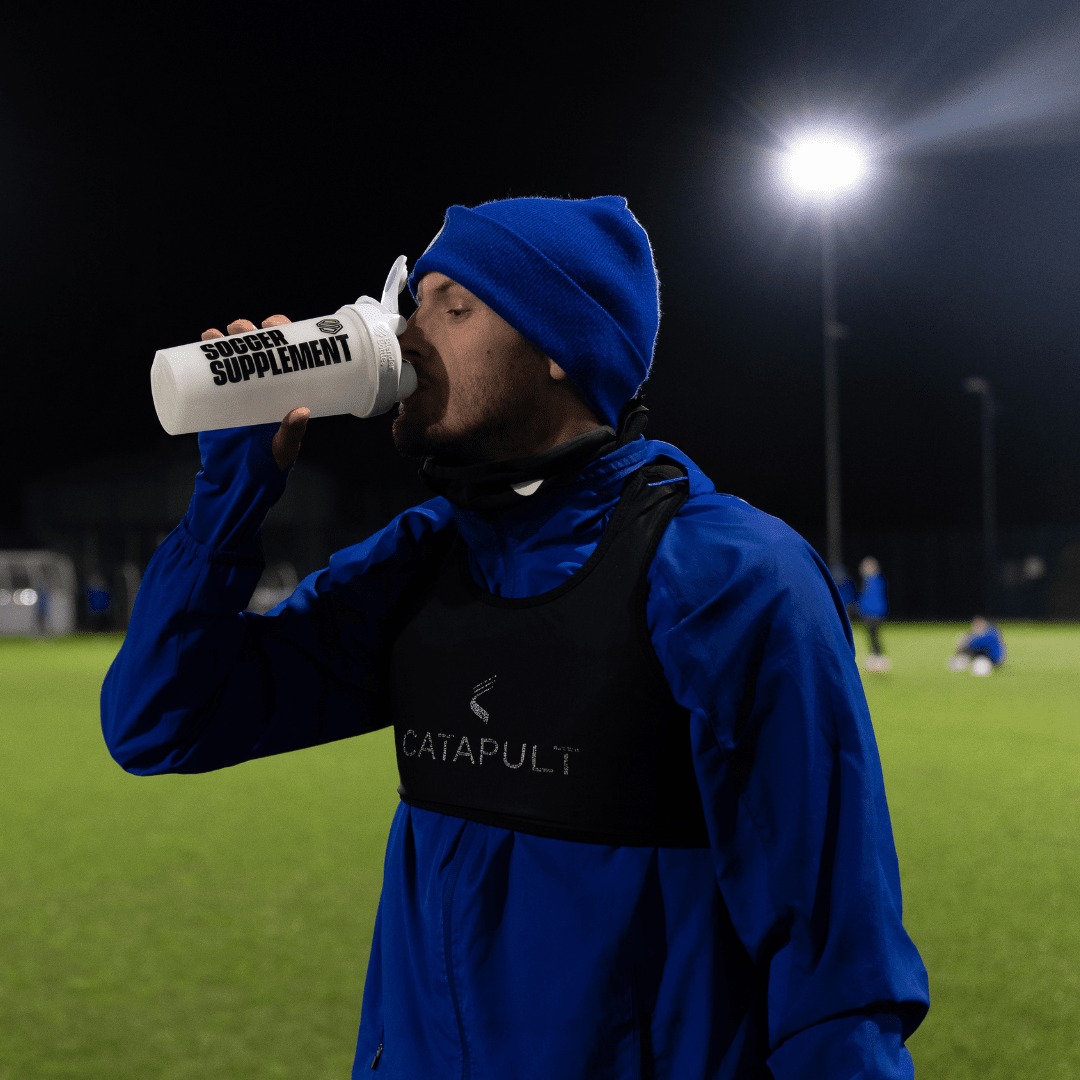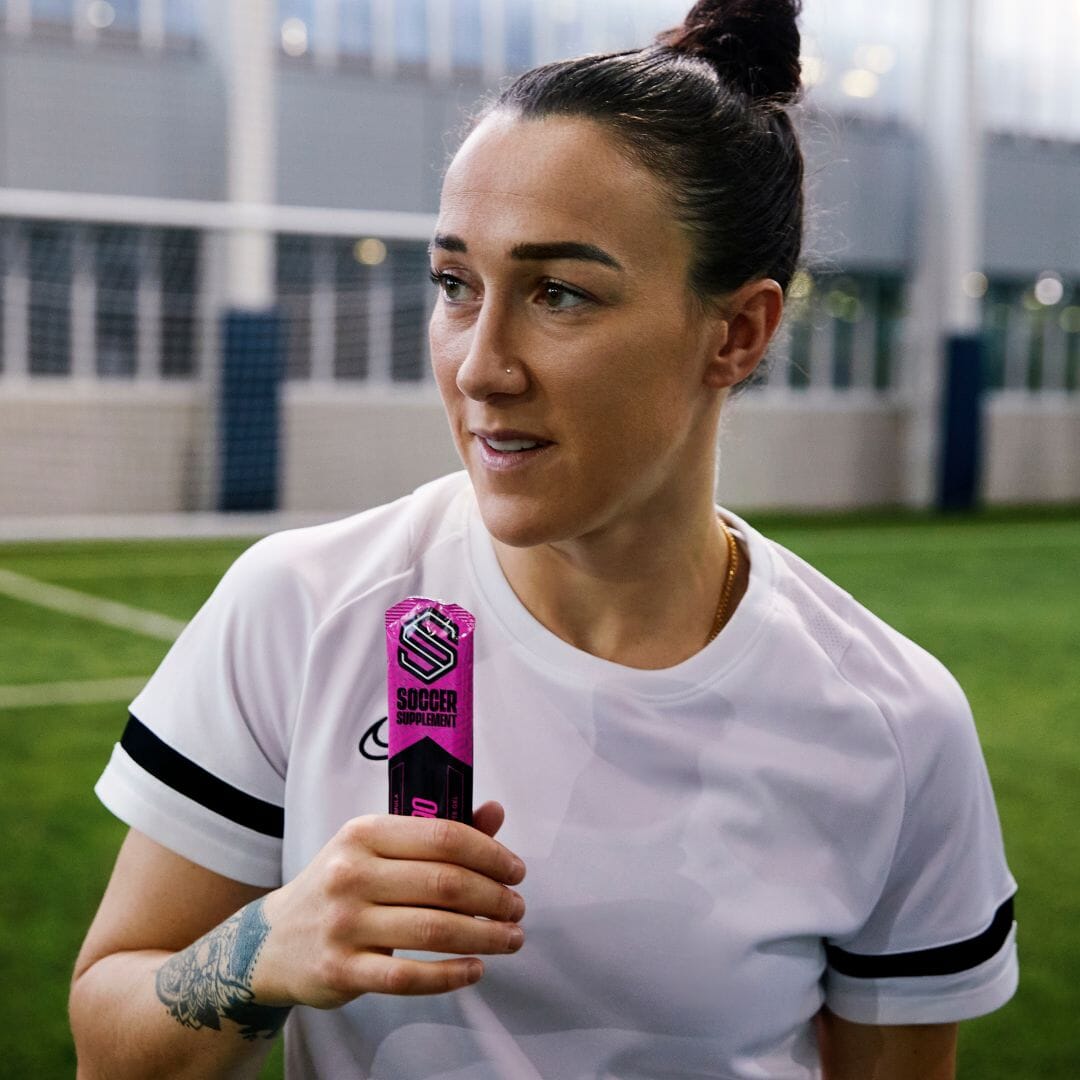Introduction
In this post, we take a look at what makes up a during-match football nutrition guide; what to consume during a match in order to perform consistently for 90 minutes.
Demands of a football match
Considering the body is made up of roughly two-thirds water, it is easy to see why we need to replace fluids and electrolytes lost so that we function optimally. In this article, I will summarise these losses and energy requirements during a football match, and end with some practical takeaways that you can implement in your own games.
The typical distance covered by a top-level, outfield player during a match is 10–13 km.1 Due to such demands of match-play, it has been observed that players that start the game with normal muscle glycogen levels (~100 mmol/kg wet weight) have low muscle glycogen levels (10 mmol/kg wet weight)
at the end of the game, with a significant number of muscle fibres depleted, or partly depleted of glycogen, by that time.2 As such, muscle glycogen/carbohydrate is probably the most important substrate for energy production for football players.
Carbohydrate intake during exercise can delay the onset of fatigue and improve performance of prolonged exercise as well as exercise of shorter duration and greater intensity (e.g. that of which occurs during a football match), but the mechanisms by which performance is improved are different.3 During prolonged exercise, the performance benefits of carbohydrate ingestion are likely achieved by maintaining or raising plasma glucose concentrations and sustaining high rates of carbohydrate oxidation, whereas, during intense exercise, carbohydrate intake seems to positively affect the central nervous system.
Carbohydrate from a single source, such as glucose, can only be oxidised at rates of approximately 60 grams per hour. When a combination of carbohydrates is ingested (e.g., glucose and fructose) oxidation rates of slightly more than 100 grams per hour can be achieved if large amounts of carbohydrate are ingested (e.g., > 140 g/h).4 However, such higher rates of carbohydrate ingestion during exercise are unnecessary for footballers and also pose the risk of gastrointestinal discomfort.5
As net fluid and electrolyte losses (during a 90-minute match) of approximately 1.1L and 110 mmol/L (sodium 49 +/- 12; potassium, 6.0 +/- 1.3; chloride, 43 +/- 10) occur,6 carbohydrate is best delivered in the form of a carbohydrate-electrolyte beverage, with a concentration of 6% (60g of carbohydrate per litre of fluid). This concentration has been repeatedly shown to optimise the emptying of fluid from the stomach; thus, carbohydrate delivery.7
In addition to carbohydrate powders and pre-packaged carbohydrate drinks, another delivery method is the ingestion of carb gels. Though typically more expensive than powders, they offer the advantage of portability as well as providing carbohydrate with minimal fluid, a factor that is important for people who don’t like to ingest large amounts of fluid during a game.
Therefore, appropriate carbohydrate ingestion strategies to support players’ performance during training and matches are fundamental to a team’s overall ability to consistently perform at a high level and crucial to football nutrition as a whole.
Recommendations
Given the demands of a football match, my fluid and fuel recommendations for a 90-minute match are 0.5-1L and 30-60g of carbohydrate, respectively. Mixing 1 sachet of our Hydrate90® energy drink with 0.5-1L of water will allow you to reach these goals. Similarly, if you prefer to have complete control over the quantities of fluids and carbohydrates that you consume, then using water and our Fuel90® gel would work well. In either scenario, the replacement of electrolytes will take care of itself. Trying things out during training will allow you to find your own ‘sweet spot’ when it comes to match day.
If you want to learn more about nutrition for football take a look at our pre-match and post-match nutrition guides.
Joseph Agu MSc.
Head of Science
Soccer Supplement ®
Click here to shop our range of Footballer Performance Supplements
References
1. Di Mascio, M. & Bradley, P. S. Evaluation of the most intense high-intensity running period in English FA premier league soccer matches. J. Strength Cond. Res. 27, 909–15 (2013).
2. Krustrup, P. et al. Muscle and blood metabolites during a soccer game: Implications for sprint performance. Med. Sci. Sports Exerc. 38, 1165–1174 (2006).
3. Jeukendrup, A., Brouns, F., Wagenmakers, A. J. M. & Saris, W. H. M. Carbohydrate-electrolyte feedings improve 1 h time trial cycling performance. Int. J. Sports Med. 18, 125–129 (1997).
4. Jeukendrup, A. E. Carbohydrate and exercise performance: the role of multiple transportable carbohydrates. Curr. Opin. Clin. Nutr. Metab. Care 13, 452–457 (2010).
5. Jeukendrup, A. A step towards personalized sports nutrition: Carbohydrate intake during exercise. Sport. Med. 44, (2014).
6. Maughan, R. J., Merson, S. J., Broad, N. P. & Shirreffs, S. M. Fluid and electrolyte intake and loss in elite soccer players during training. Int. J. Sport Nutr. Exerc. Metab. 14, 333–346 (2004).
7. Coyle, E. Fluid and fuel intake during exercise. J. Sports Sci. 22, 39–55 (2004).











